John Hurrell – 22 May, 2014
The video by Bik Van der Pol for the Maldives project is a long film of aerial shots of two barges creating an island, by sucking up sand-laden seawater, and firing out jets of sand so it piles up. The helicopter footage of sluiced airborne sand is spectacular and quite mysterious - even haunting. Initially it takes a while to grasp what it is you are looking at.
Pakuranga
Group show
The Maldives Exodus Caravan show
Curated by Soren Dahlgaard (with Elena Gilbert and Microclima)
8 March - 13 July 2014
This unusual exhibition is presented in a seventies Concord caravan that is usually positioned outside Te Tuhi’s Reeves Rd entrance, or else in various sites around Auckland’s inner city, such as Queens Wharf. The New Zealand built, towable gallery (as a portable or nomadic pavilion) has a lot crammed into it, not only artworks by international artists alarmed by the political and ecological situation in the Maldives, but contributions from local Maldivian artists and musicians, as well as contextualising information in the form of television docos about the Maldives themselves - their recent history.
The idea of a caravan came about when Soren Dahlgaard, a Danish artist living in the Maldives, found in 2012 that the democratically elected leader Mohamed Nasheed was forced out by his vice president, Mohamed Waheed Hassan (who claims the transferral of power was voluntary), and that the pavilion in the 2013 Venice Biennale that Dahlgaard (with Nasheed’s help) had previously organised to focus on the impact of climate change on sea-level (50 years apparently are left before the islands disappear) was usurped by the new government. So The Maldives Exodus Caravan Show, distinctive with an inflatable palm tree and island on its roof, became an alternative.
The New Zealand version of this show, like the Venetian one, is aimed at spotlighting the lack of democratic elections in the Maldives, the current repressive rule, and threat of a rising sea-level, presented to a range of communities when the art is brought to their doorstep. The caravan though, with its typical seventies décor (lots of wood veneer and orange drapes) and cramped viewing conditions, does have problems with visual and aural overload. The music makes it hard to listen to the soundtracks of the television programmes or artworks, despite headphones, and many of the reproduced images on the walls seem piecemeal and in isolation, with no context provided.
However the project shines when it comes to the videos. Some are outstanding, particularly the works by SUPERFLEX, Bik Van der Pol, Antti Laitinen, Alexander Ponomarev, and Mark Harvey. SUPERFLEX were brought out to Artspace by Brian Butler for a suite of projects, such as the distribution of a recipe for free beer, and they also have exhibted in the Govett-Brewster. This time in Pakuranga they present a fascinating video showing the flooding of a McDonald’s café, its imagery of immersed food and furniture rich in metaphorical and historical implications.
Bik Van der Pol also came out to Auckland a few years ago. They had an Elam residency and contributed a relational event in Albert Park for One Day Sculpture. Their video here for the Maldives project is a long film of aerial shots of two barges creating an island, by sucking up sand-laden seawater, and firing out jets of sand so it piles up. The helicopter footage of sluiced airborne sand is spectacular and quite mysterious - even haunting. Initially it takes a while to grasp what it is you are looking at.
The video of Antti Laitinen shows the artist rowing a raft disguised as an island. It supports a real palm tree and like Soren Dahlgaard’s inflatable sculpture, raises issues about the physical state of the Maldives: will global warming cause the islands to be inundated and disappear? Where will the people - in their ‘Exodus’ - go?
Alexander Ponomarev’s work uses two monitors side by side again to comment on the seemingly inevitable disappeaance of the Maldives. One shows somebody scraping off an island drawn on a plastic nautical chart, while the other shows an island being hidden by specially organised clouds of smoke. It slowly disappears from view.
Mark Harvey’s video shows the University of Auckland lecturer in Venice, engaging visitors and the locals on the streets by challenging them to a debate about climate change and/or a friendly wrestle. In its own affable way, this activity focused not only on the alarming global meteorological situation, but also (obliquely perhaps) on the conflict between the two rival political parties in the Maldives, and the struggle for power, the contest between Mohamed Waheed Hassan and Mohamed Nasheed. The work’s title, Political Climate Wrestle can be taken several ways.
This interesting and informative, jam-packed show might work better if experienced in a more contextually apt site near the sea - as seen in downtown Auckland. As it regularly moves around, it is worth checking its location to find out.
John Hurrell
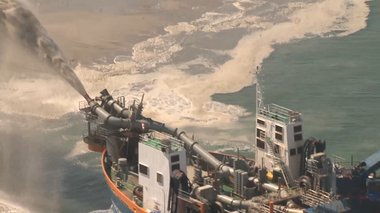
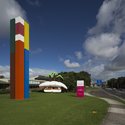


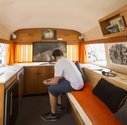



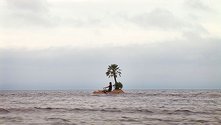

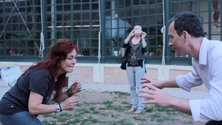
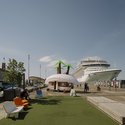



 Advertising in this column
Advertising in this column Two Rooms presents a program of residencies and projects
Two Rooms presents a program of residencies and projects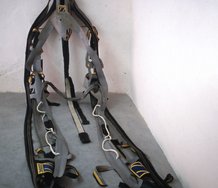
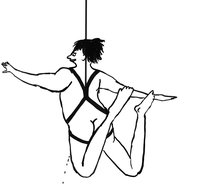
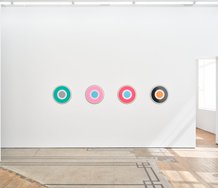
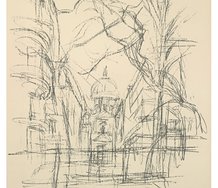
This Discussion has 0 comments.
Comment
Participate
Register to Participate.
Sign in
Sign in to an existing account.